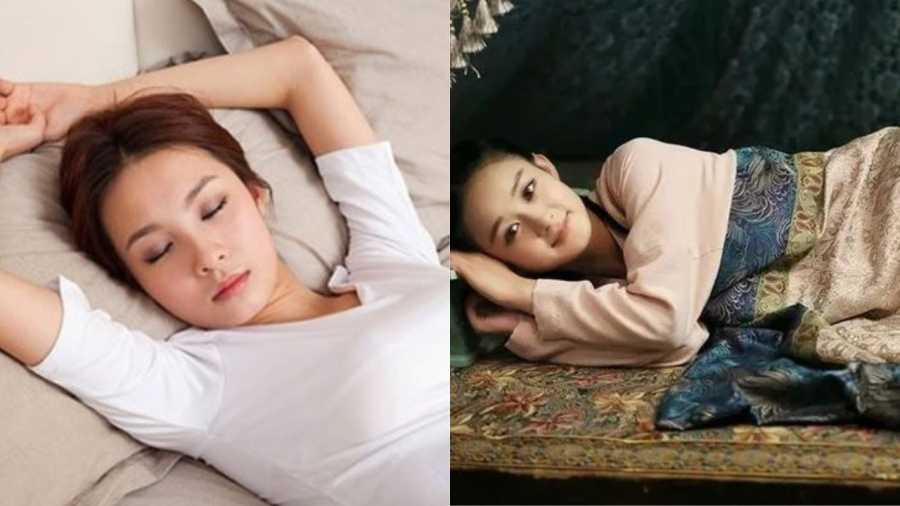The ancients had very strict criteria when raising children. Sons had to study the Four Books and Five Classics, while daughters had to possess the Four Virtues and Three Obediences. Especially for women in ancient times, they had to conform to many standards in order to be considered proper. A girl who did not conform to these standards was considered to be of loose morals and undesirable for marriage. If her parents were unable to find a suitable match for her, it would cause a great deal of distress, as an unmarried woman in ancient times would face a life of solitude and be looked down upon by society.
Among the many expectations placed on girls, one of them was not staying up late, not taking naps, and not sleeping on their backs.

The ancients believed that girls who stayed up late and took daytime naps were not virtuous.
What happens if a girl stays up late and takes daytime naps?
In ancient times, women usually stayed at home and took care of household chores, rarely venturing outside. However, even within the confines of their homes, they still had to adhere to the societal expectations placed upon them. Girls who stayed up late and took daytime naps were considered to be behaving improperly. Those who stayed up late were thought to have impure thoughts or engage in secret rendezvous with men, as staying up late was seen as a way to meet men.
Staying up late and taking daytime naps would result in feeling tired and needing to take a nap the next day, further lowering a girl’s standing. Girls who took daytime naps were seen as lazy.
Furthermore, staying up late and taking daytime naps would prevent women from fulfilling their domestic duties effectively. Men could stay up late reading or engaging in important discussions, while women who stayed up late would feel tired and be unable to properly perform tasks such as cooking and taking care of their families.
Moreover, a woman who stays up late would appear tired and weary the next day, giving off a sense of melancholy. This would negatively affect the feng shui of the household. Husbands want to wake up to a beautiful, energetic wife who can prepare meals and take care of the household in an orderly fashion. If a woman stays up late and takes daytime naps, this cannot be guaranteed. Therefore, girls with these habits would not be highly regarded. Matchmakers would hesitate to arrange marriages for such girls, making it difficult for them to find a good husband.

The ancients believed that lying on one’s back does not demonstrate the modesty of a woman, only lying on one’s side would be considered virtuous. Illustration
What happens if a girl sleeps on her back?
Lying on one’s back while sleeping is a position that many people adopt today because it is considered to be beneficial from a scientific standpoint. However, in ancient times, women were discouraged from sleeping on their backs and were instead encouraged to sleep on their sides. This is because sleeping on one’s back was considered to be unattractive and lacking in grace.
Sleeping on one’s side demonstrated modesty and reserve. Girls who slept on their backs were seen as carefree, even considered to be lacking in virtue. In ancient times, they would be seen as unfashionable and lacking in decorum. Therefore, girls who slept on their backs will be judged. Sleeping on one’s back can also cause one’s mouth to hang open, which is considered unattractive.
On the other hand, lying on one’s side is considered graceful and modest. Furthermore, lying on one’s side can also help temper one’s sexual desires.
As a result, in the ancient belief system, girls who stayed up late, took daytime naps, and slept on their backs were seen as lacking in grace and were considered to be poorly educated. This made it difficult for them to find a good husband, causing much anxiety for their families. A grown-up daughter who has trouble finding a husband is a source of “shame” for the family and brings harm to the family.
However, times have changed, and so have the beliefs. Women are no longer restrained by as many criteria as before. However, it is still not recommended to stay up late as it can be detrimental to health and skin. Taking a nap is advisable, but it should not be too long to avoid affecting both health and productivity. Sleeping on one’s back is considered to be a healthy position for many people, but in certain contexts such as in the workplace, public places, many people still believe that sleeping on one’s side or with a blanket covering oneself appears more modest. Sleeping on one’s back, especially if seen by strangers, especially men, may not be viewed as virtuous and may even provoke sexual desires.
This information is provided for reference and educational purposes.
































